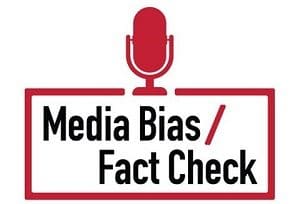LEFT-CENTER BIAS
These media sources have a slight to moderate liberal bias. They often publish factual information that utilizes loaded words (wording that attempts to influence an audience by appeals to emotion or stereotypes) to favor liberal causes. These sources are generally trustworthy for information but may require further investigation. See all Left-Center sources.
- Overall, we rate The Guardian Left-Center biased based on story selection that moderately favors the left and Mixed for factual reporting due to numerous failed fact checks over the last five years.
Detailed Report
Bias Rating: LEFT-CENTER
Factual Reporting: MIXED
Country: United Kingdom
Press Freedom Rank: MOSTLY FREE
Media Type: Newspaper
Traffic/Popularity: High Traffic
MBFC Credibility Rating: MEDIUM CREDIBILITY
History
Launched in 1821, The Guardian is a British daily newspaper published in London, UK. Its original name is The Manchester Guardian, and cotton merchant John Edward Taylor founded it. Taylor’s nephew Charles Prestwich Scott (CP Scott) was the first editor and later became the paper owner (1846 –1932). He was also a Liberal Member of Parliament. After CP Scott, his son John Russell Scott became the Manchester Guardian’s manager and founder of the Scott Trust. The Manchester Guardian was renamed the Guardian in 1959. In 1993 the Guardian Media Group acquired the Observer.
The Guardian U.S. was launched in 2011 in New York. They also have an Australia Edition (Launched in 2013, digital edition) and an International edition. The paper focuses on politics, policy, business, and international relations. Their coverage includes News and Opinion, Sports, Culture, Lifestyle, Podcasts, and more.
You can view the Guardian U.S. editorial team here.
Read our country and media profile.
Funded by / Ownership
The Guardian and its sister publication, the Sunday newspaper The Observer, are owned by Guardian Media Group plc (GMG). Scott Trust Limited was created in 1936 to ensure the editorial independence of the publications and owns Guardian Media Group plc (GMG). The Guardian states that “The Scott Trust is the sole shareholder in Guardian Media Group, and its profits are reinvested in journalism and do not benefit a proprietor or shareholders.” Donations and advertising fund the Guardian.
The Guardian switched to a tabloid print format in 2018 to cut costs. According to The New York Times, The Guardian “refused to set up a paywall — the preferred strategy of many of its rivals, from The Times of London to The Wall Street Journal and The New York Times — opting instead to ask its readers for donations, even setting up a nonprofit arm to help fund its journalism.”
Analysis / Bias
The Guardian has always been a left-wing publication throughout its history, as they have stated in various articles.
In review, story selection favors the left but is generally factual. They utilize emotionally loaded headlines such as “The cashless society is a con – and big finance is behind it” and “Trump back-pedals on Russian meddling remarks after an outcry.” The Guardian typically utilizes credible sources such as thoughtco.com, gov.uk., and factually mixed sources such as HuffPost and independent.co.uk.
A 2014 Pew Research Survey found that 72% of The Guardian’s audience is consistently or primarily liberal, 20% Mixed, and 9% consistently or mostly conservative. This indicates that a more liberal audience strongly prefers the Guardian. Further, a Reuters institute survey found that 52% of respondents trust their news coverage and 19% do not, ranking them #7 in trust of the major UK news providers.
The Guardian holds a left-leaning editorial bias and sometimes relies on sources that have failed fact checks. Further, while The Guardian has failed several fact checks, they also produce an incredible amount of content; therefore, most stories are accurate, but the reader must beware, and hence why we assign them a Mixed rating for factual reporting.
Failed Fact Checks
- Is everything you think you know about depression wrong? – False
- Firms bidding for government contracts asked if they back Brexit. – False
- The proportion of lung cancer cases only diagnosed after a visit to an A&E ranges from 15% in Guildford and Waverley in Surrey to 56% in Tower Hamlets and Manchester. – Inaccurate
- Private renting is making millions of people ill. – False
- The number of vegans in the U.K. has risen from half a million in 2016 to 3.5 million today. – False
- New legislation introduced to change laws on workplace rights. – False
- The justice budget has fallen by 40% since 2010. – False (Corrected)
- “The proportion of people with a job who live in poverty went up for the third consecutive year in 2018 to a record high” – False (Corrected)
- “The number of children needing foster care has risen by 44% during the coronavirus pandemic, creating a “state of emergency,” a children’s charity said.” – False
- 915 children admitted with malnutrition in Cambridge hospitals between 2015 and 2020. There were 656 similar admissions at Newcastle hospitals and 656 at the Royal Free London hospitals. – False
- Nine percent of parents surveyed say their children have started self-harming in response to the cost of living crisis. – False
Overall, we rate The Guardian Left-Center biased based on story selection that moderately favors the left and Mixed for factual reporting due to numerous failed fact checks over the last five years. (5/18/2016) Updated (M. Huitsing 09/10/2022)
Source: https://www.theguardian.com
Last Updated on July 1, 2023 by Media Bias Fact Check
Do you appreciate our work? Please consider one of the following ways to sustain us.
or
Left vs. Right Bias: How we rate the bias of media sources


